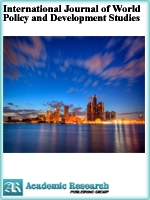International Journal of World Policy and Development Studies
Online ISSN: 2415-2331
Print ISSN: 2415-5241
Print ISSN: 2415-5241
Quarterly Published (4 Issues Per Year)

Archives
Volume 5 Number 4 April 2019
Determinants of Off-farm Employment Participation of Women in Rural Uganda
Authors: Fang Cheng ; Haisen Zhang ; Nobeji S. Boniphace
Pages: 28-41
DOI: doi.org/10.32861/ijwpds.54.28.41
Abstract
Off-farm employment in rural areas can be a major contributor to rural poverty reduction and decent rural employment. While women are highly active in the agricultural sector, they are less active than men in off-farm employment. This study analyzes the determinants of participation in off-farm employment of women in rural Uganda. The study is based on a field survey conducted in nine districts with the sample size of 1200 individual females. A two-stage Hechman’s sample selection model was applied to capture women’s decision to participate and the level of participation in non-farm economic activities. Summary statistics of the survey data from rural Uganda shows that: i) poverty and non-farm employment has a strong correlation, implying the importance of non-farm employment as a means for poverty reduction; and ii) there is a large gender gap to access non-farm employment, but the gender gap has been significantly reduced from group of older age to younger generation. The econometric results finds that the following factors have a significant influence on women’s participation in off-farm employment: education level of both the individual and household head (positive in both stages); women’s age (negative in both stages); female-headed household (negative in first stage); household head of polygamous marriage (negative in both stages); distance from major town (negative in the first stage); household size (positive in the second stage); dependency ratio (negative in the second stage); access to and use of government extension services (positive in the first stage); access to and use of an agricultural loan (negative in the second stage); and various district dummies variables. The implications of these findings suggest that those policies aimed at enhancing the identified determinants of women off-farm employment can promote income-generating opportunities for women groups in comparable contexts. In order to capitalize on these positive linkages, policies should be designed to improve skills and knowledge by providing education opportunities and increasing access to employment training, assistance services and loans for non-farm activities and by targeting women in female-headed, large and distant households. The government should increase investments in public infrastructure and services, such as roads, telecommunications and emergency support.



